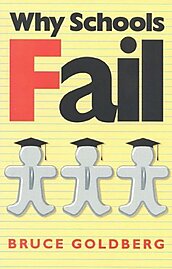It is becoming increasingly clear that government schools have failed. SAT scores are low, dropout rates are staggeringly high, and violence is often rampant.
In Why Schools Fail, Bruce Goldberg explains the many reasons for the failure of public schooling and offers a prospective remedy to the educational mess in which the United States finds itself.
Goldberg traces the history of public schools and the dominant educational theories of the past 150 years, including behaviorism, progressivism, structuralism, and traditionalism. He argues that all of those theories are flawed because they presume that children are essentially interchangeable and thus can be educated in the same way. To Goldberg, “It is the denial of individuality, the idea that everyone must follow some general plan, that is at the core of the failure of the schools.”
He argues that educators who claim they have “scientific knowledge” of what children need are sorely mistaken. From Horace Mann in the 1840s to Chester Finn and Diane Ravitch in the 1980s, Goldberg contends that such theorists simply do not understand how children learn. There is no one path to intellectual advancement.
Not all children need, or want, to learn Latin, take math for 12 years, or read from a “Great Books” list that, at best, has been randomly compiled. Instead, they should be free to pursue the things that interest them and at which they are adroit. If that were allowed, schooling would no longer be viewed by many children as tortuous and mind-numbing; it would be considered exciting and productive.
Goldberg argues that such a scenario is unlikely to develop as long as the public school monopoly remains in place. He writes that the “public school system, despite occasional lip service to the idea, has been at war with individuality.”
If competition were introduced via a system of vouchers, however, the stifling effects of the one-size-fits-all educational approach could be mitigated. While he concedes that there will remain certain private schools that do not appreciate the merits of individualism—such as military academies and many religious schools—he contends that a “system of competing schools will produce a vigorous and thorough discussion of standards, and there is not even a remote chance of that happening in the present system.” With competition “there will not be such casual suppression of the character and interests of children in favor of some expert’s personal taste.”
The time has come for society to reappraise the way it educates children. As Goldberg writes, “It is a time to create an environment in which schools will not only operate efficiently but will also, more important, recognize and respond to the fact that children are all different and have different needs. It is time to create an environment that will nurture and encourage individuality instead of treating it as irrelevant.”
